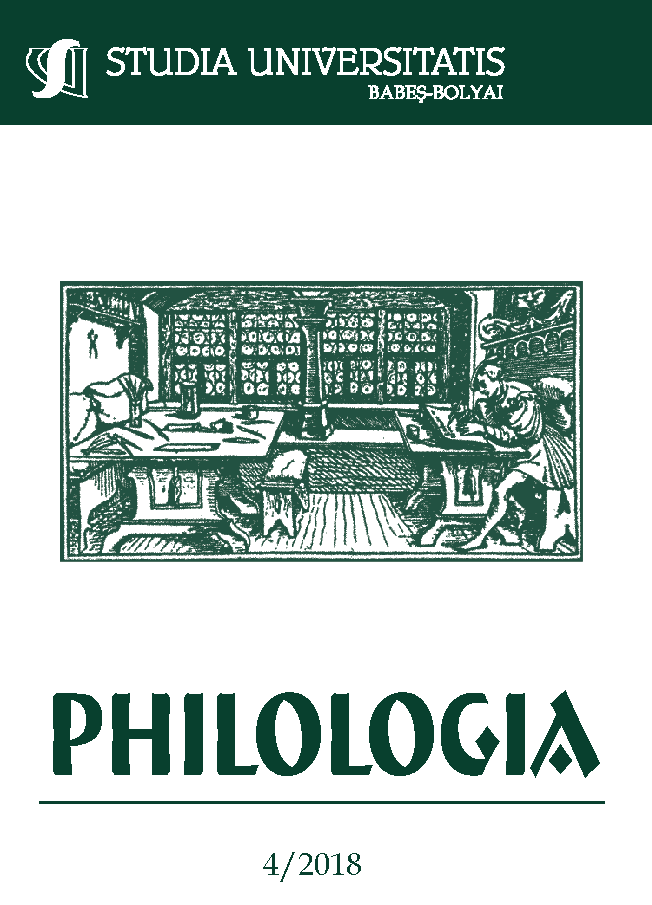COFFEE, TRUFFLES AND OTHER DELIGHTS IN ANNE ENRIGHT’S “THE PLEASURE OF ELIZA LYNCH”
DOI:
https://doi.org/10.24193/subbphilo.2018.4.11Keywords:
Anne Enright, The Pleasure of Eliza Lynch, Julia Kristeva, the abject, food, the female body, the mother, history.Abstract
Coffee, Truffles and Other Delights in Anne Enright’s “The Pleasure of Eliza Lynch”. Anne Enright’s novel The Pleasure of Eliza Lynch follows its pregnant protagonist’s journey into the city of Asunción and Dr William Stewart’s away from the city, into the more innocent but war-ravaged Cordillera mountains in mid-nineteenth century Paraguay. Food and its lack are a leitmotif of Enright’s novel, variously featuring banquets, rampant consumerism, famine and cannibalism. A fictional biography of historical figures and also a commentary on contemporary consumerism, The Pleasure foregrounds Eliza’s embodied experience of pregnancy, with its cravings and physiological transformations, and displaces the historical perspective onto the European observer, Dr Stewart, who echoes the baffled fascination and revulsion and the patriarchal moral stance of male historians writing about the colonies. Moreover, in a country on the brink of modernisation, Stewart’s ambivalent reaction to the viscerality of both sexuality and wartime violence typifies the experience of abjection that pre-dates and triggers the formation of norms and the establishment of the symbolic order in subject formation. My essay draws on Julia Kristeva’s theory of abjection in order to show how Enright uses representations of food and the female body to problematise historical processes and the position of women within the order of discourse.
Rezumat. Cafea, trufe și alte delicii în “Plăcerea Elizei Lynch” de Anne Enright. Romanul Annei Enright, Plăcerea Elizei Lynch, urmărește călătoria protagonistei la Asunción și pe cea a doctorului William Stewart, care se îndepărtează de oraș spre ținutul mai inocent dar răvășit de război al Anzilor Cordilieri, în Paraguayul de la mijlocul secolului XIX. Hrana și lipsa acesteia sunt un leitmotiv al romanului, într-o gamă care se întinde de la banchet sau consumismul neînfrânat până la foamete sau canibalism. O biografie ficțională a unor figuri istorice și în același timp un comentariu asupra consumismului contemporan, romanul aduce în prim plan experiența corporală a gravidității Elizei Lynch, cu poftele și transformările ei fiziologice, și deplasează perspectiva istorică în sarcina observatorului european, doctorul Stewart, care se face ecoul fascinației descumpănite, repulsiei și poziției moraliste patriarhale cu care istoricii de gen masculin scriau îndeobște despre colonii. Mai mult, într-o țară aflată în pragul modernizării, reacția ambivalentă a lui Stewart la visceralitatea sexualității și violenței războiului e tipică pentru experiența abjecției care precedă și totodată cauzează stabilirea unor norme și a unei ordini simbolice în formarea subiectivității. Eseul de față se bazează pe teoria abjecției elaborată de Julia Kristeva pentru a arăta modul în care Enright folosește reprezentări ale hranei și ale corpului feminin pentru a tematiza procese istorice și poziția femeilor în ordinea discursului.
Cuvinte cheie: Anne Enright, Plăcerea Elizei Lynch, Julia Kristeva, abjectul, corpul feminin, maternitate, istorie
References
Bracken, Claire. 2010. “Queer Intersections and Nomadic Routes: Anne Enright’s The Pleasure of Eliza Lynch.” The Canadian Journal of Irish Studies 36, no. 1, Queering Ireland, 109-27.
Bracken, Claire, and Susan Cahill, eds. 2011. Anne Enright. Dublin and Portland, OR: Irish Academic Press.
Coughlan, Patricia. 2005. “‘Without a Blink of Her Lovely Eye’: The Pleasure of Eliza Lynch and Visionary Scepticism.” Irish University Review 35, no. 2, 349-73.
Enright, Anne. 2003. The Pleasure of Eliza Lynch. London: Vintage.
Enright, Anne, and Shirley Kelly. 2002. “What It’s like to Have the Future Inside You.” Books Ireland 252 (October), 235-36.
Kristeva, Julia. 1982. Powers of Horror: An Essay on Abjection. Translated by Leon S. Roudiez. New York: Columbia University Press.
Lee, Hermione. 2002. “All Reputation.” Review of The Pleasure of Eliza Lynch by Anne Enright and Clara by Janice Galloway. London Review of Books 24, no. 20 (17 October): 19-20. https://www.lrb.co.uk/v24/n20/hermione-lee/all-reputation.
Lillis, Michael. 2008. “From the Files of the ‘DIB’: Paraguay’s Irish ‘National Heroine’.” History Ireland 16, no. 4, Ireland and Latin America: 66. https://www.historyireland.com/18th-19th-century-history/from-the-files-of-the-dib-paraguays-irish-national-heroine/.
Warren, Harris Gaylord. 1962. “The Paraguayan Image of the War of the Triple Alliance.” The Americas 19, no. 1, 3-20.
Warren, Harris Gaylord. 1969. “Dr. William Stewart in Paraguay, 1857-1869.” The Americas 25, no. 3, 247-64.
Downloads
Published
How to Cite
Issue
Section
License
Copyright (c) 2018 Studia Universitatis Babeș-Bolyai Philologia

This work is licensed under a Creative Commons Attribution-NonCommercial-NoDerivatives 4.0 International License.





 ©Studia Universitatis Babeş-Bolyai Philologia. Published by Babeș-Bolyai University.
©Studia Universitatis Babeş-Bolyai Philologia. Published by Babeș-Bolyai University.